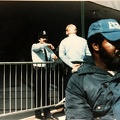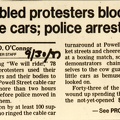San Francisco Chronicle
WEDNESDAY, SEPTEMBER 30, 1987
This story continues in ADAPT 365 and ADAPT 360 but the entire text is included here for easier reading.
Title: Chains Halt the Cable Cars
Photo by Jerry Telfer/The Chronicle:
Two people in wheelchairs block a cable car. One sits in a manual chair with his back to the camera and another sits sideways to the camera (Mike Auberger) in front of the Cable Car door. They are chained with a long chain to the cable car. From inside, a man (Frank Lozano) stands in the stairwell talking with them.
Caption reads: Handicapped demonstrators chained themselves to cable cars yesterday at San Francisco's Powell Street turntable, halting the system for more than two hours. Police arrested 75 people. The protesters have lobbied the American Public Transit Association convention at Moscone Center for improved access to transportation for the disabled. Story on Page A2
Title: Disabled protesters block cable cars; police arrest 78
By John D. O’Connor, of the examiner staff
Chanting “We will ride!,” 78 disabled protesters used their wheelchairs and their bodies to block the Powell Street cable car line for more than two hours Tuesday before police moved in to arrest them.
Urged on by at least 100 supporters who ringed the cable car turnaround at Powell and Market streets and cheered like fans at a boxing match, some of the demonstrators chained themselves to the cow guards of the little cars as bemused tourists looked on.
Forty-three of the protesters wound up spending the night in the not-yet-opened $1 million-plus gymnasium on the seventh floor of the Hall of Justice, Sheriff Mike Hennessey said.
“There’s nothing but generally pleasant feelings among them,” Hennessey said after inspecting the facilities for the wheelchair-bound demonstrators, who had refused to sign citations issued by the police.
Hollyann Fuller Boies, an organizer with the September Alliance For Accessible Transit, said the group selected the cable cars as the focus of their protest because they symbolized the general inaccessibility of all public transit vehicles.
"This is a problem that needs attention now,” Boies said. “It’s not just the cable cars, it’s almost every form of public transportation, and nothing is being done to remedy the situation.”
But MUNI spokesman Tom Rockert said the protesters’ wrath was misdirected.
“A cable car is just the very last thing we could modify to accommodate a handicapped person,” he said. “It has no power. We’d need an awful lot of batteries to power a lift of the type they’d need. Besides, we’re committed to making our rubber-wheeled fleet more accessible to the handicapped.”
Rickert said MUNI’s Elderly & Handicapped Advisory Committee, which is made up of elderly and handicapped people, decided “that cable cars could not be modified to be accessible and that from a technical point of view such a proposal is not feasible, practical or safe.”
Boies said the people arrested were willing to stay in jail to draw attention to their cause rather than sign the citations offered by the police.
By 5 p.m., most of those arrested appeared ready to do just that. Lt. John Gleeson of the police Tactical Detail said 48 of the 78 arrested had refused to sign and were preparing for a night in jail.
Henessey said 43 were housed in the new gym. He said the rest were let go for a future court date because they had no prior arrests in the three days of demonstrations.
Hennessey said he and his staff, knowing about the demonstrations in advance, had planned for the protesters to be housed in the gym by borrowing cots from San Francisco and Laguna Honda hospitals and other city-operated medical facilities.
“Actually, we anticipated 75 to 80 persons,” Hennessey said.
Outside the Hall of Justice on Bryant Street, 75 wheelchair-bound sympathizers held a candlelight vigil Tuesday night and chanted, “Let our people go.”
The protesters, who also staged noisy demonstrations outside a convention of American Public Transit Association members at Moscone Center Monday and on the steps of City Hall Sunday night, said that they hope their actions will force APTA to adopt a national policy regarding handicapped access to public transit.
Photo by Examiner/Katy Raddatz: A little girl in a wheelchair (Jennifer Keelan) leans forward resting her head on a heavy rope barrier. Behind her, holding a push handle of her chair, a woman (Cyndy Keelan) in an ADAPT no steps/we will ride T-shirt stands among a crowd. All are watching something beyond the camera. Caption reads: Cynthia Keelan and daughter, Jennifer, of Tempe Ariz. From behind cable car rope, they watch protest of disabled.
- Author
- San Francisco Chronicle, John D. O'Connor, photos Jerry Telfer & Katy Raddatz
- Created on
- Thursday 11 July 2013
- Posted on
- Friday 18 October 2019
- Tags
- access policy, accessible transit, APTA - American Public Transit Association, arrested, cable car turnaround, cable cars, chains, citations, Cyndy Keelan, Elderly & Handicapped advisory committee, Frank Lozano, gym, Hall of Justice, handicapped, Hollyann Fuller Boies, hospital, inaccessible transportation, Jennifer Keelan, Laguna Honda, Market St, Mike Auberger, Moscone Center, MUNI, Powell St, SAAT, San Francisco City Hall, San Francisco jail, We will ride
- Albums
- Visits
- 2304
- Rating score
- no rate
- Rate this photo


0 comments